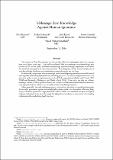3-Message Zero Knowledge Against Human Ignorance
Author(s)
Bitansky, Nir; Brakerski, Zvika; Kalai, Yael; Paneth, Omer; Vaikuntanathan, Vinod
DownloadVaikuntanathan_3-message.pdf (355.5Kb)
OPEN_ACCESS_POLICY
Open Access Policy
Creative Commons Attribution-Noncommercial-Share Alike
Terms of use
Metadata
Show full item recordAbstract
The notion of Zero Knowledge has driven the field of cryptography since its conception over thirty years ago. It is well established that two-message zero-knowledge protocols for NP do not exist, and that four-message zero-knowledge arguments exist under the minimal assumption of one-way functions. Resolving the precise round complexity of zero-knowledge has been an outstanding open problem for far too long.
In this work, we present a three-message zero-knowledge argument system with soundness against uniform polynomial-time cheating provers. The main component in our construction is the recent delegation protocol for RAM computations (Kalai and Paneth, TCC 2016B and Brakerski, Holmgren and Kalai, ePrint 2016). Concretely, we rely on a three-message variant of their protocol based on a key-less collision-resistant hash functions secure against uniform adversaries as well as other standard primitives.
More generally, beyond uniform provers, our protocol provides a natural and meaningful security guarantee against real-world adversaries, which we formalize following Rogaway’s “human-ignorance” approach (VIETCRYPT 2006): in a nutshell, we give an explicit uniform reduction from any adversary breaking the soundness of our protocol to finding collisions in the underlying hash function.
Date issued
2016-10Department
Massachusetts Institute of Technology. Computer Science and Artificial Intelligence Laboratory; Massachusetts Institute of Technology. Department of Electrical Engineering and Computer ScienceJournal
Theory of Cryptography
Publisher
Springer-Verlag
Citation
Bitansky, Nir et al. “3-Message Zero Knowledge Against Human Ignorance.” Hirt, M. and Smith, A., editors. Theory of Cryptography. TCC 2016. Lecture Notes in Computer Science 9985 (2016): 57–83 © 2016 International Association for Cryptologic Research
Version: Author's final manuscript
ISBN
978-3-662-53640-7
978-3-662-53641-4
ISSN
0302-9743
1611-3349